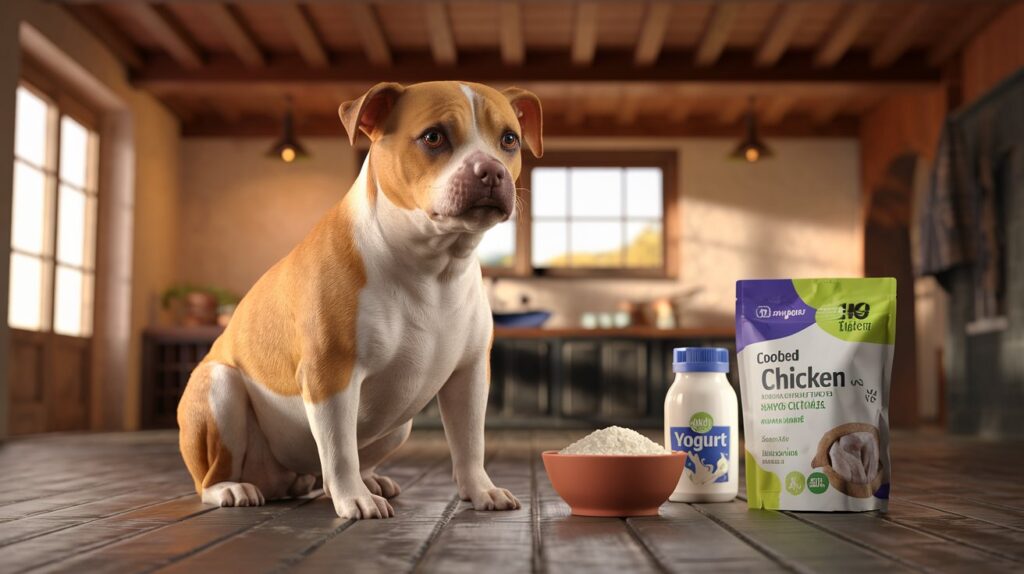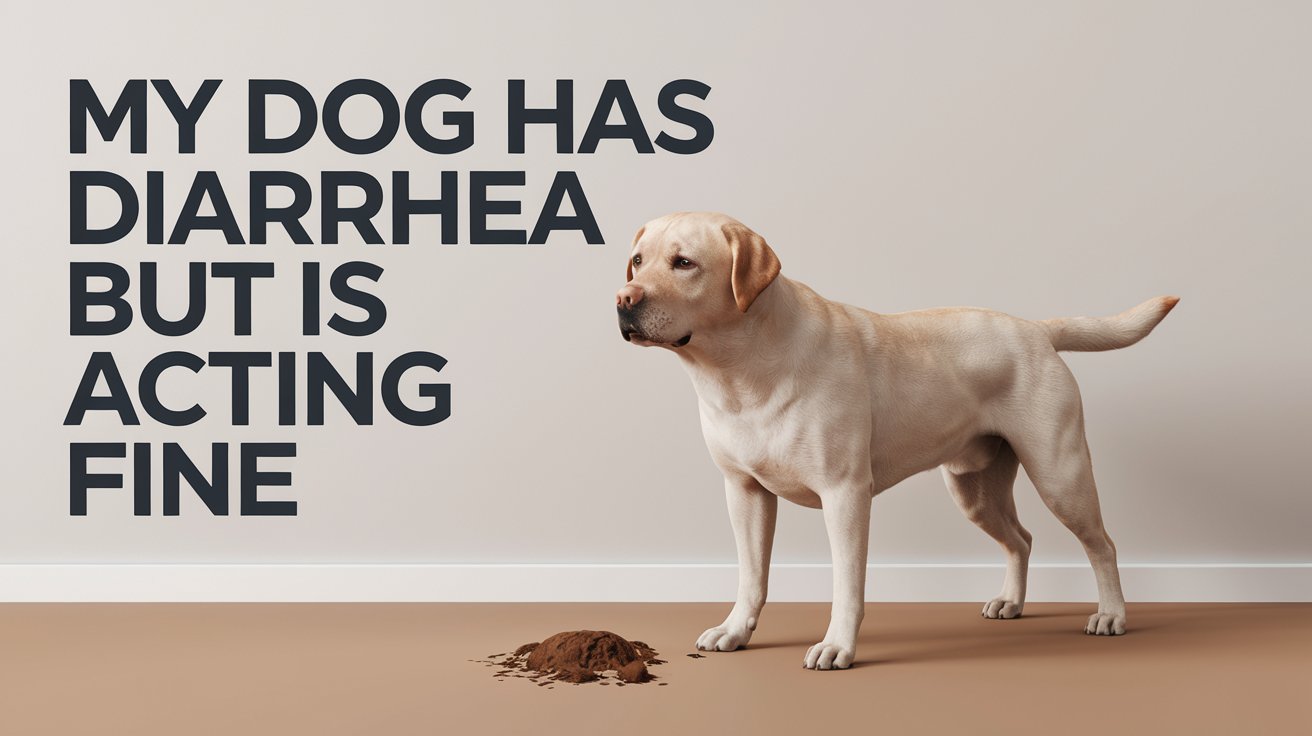
My Dog Has Diarrhea But Is Acting Fine?
My Dog Has Diarrhea But Is Acting Fine? Dogs are tough creatures! Like people, they can experience mild stomach upsets that don’t affect their energy levels or mood. If your dog has a mild case of diarrhea but is otherwise eating, playing, and behaving as usual, it’s often because the issue is minor and not affecting them much. Their resilience can be surprising, and sometimes, the diarrhea will resolve independently without much fuss.
Common Causes of Diarrhea When Dogs Seem Fine
There are a few common culprits that can cause your dog to have diarrhea even though they appear to feel fine:
- Dietary changes: Switching your dog’s food too quickly can upset their stomach.
- Food intolerance: Some dogs are sensitive to certain ingredients, which can lead to diarrhea.
- Stress or anxiety: Dogs, like humans, can get an upset stomach when they’re anxious or stressed.
- Eating something unusual: Dogs are curious and sometimes get into the trash or eat something they shouldn’t.
- Mild infections or parasites: Occasionally, dogs can contract minor infections or have parasites that cause diarrhea without making them feel ill.
Understanding Dog Diarrhea
Diarrhea is not a disease in itself, but a symptom of an underlying issue. It happens when the digestive system becomes irritated or disrupted, leading to loose or watery stools. In some cases, diarrhea in dogs can pass quickly and be nothing to worry about. However, it can also be a sign of a more serious condition that requires attention.
Types of Diarrhea in Dogs
There are two main types of diarrhea in dogs:
- Acute diarrhea: This comes on suddenly and is usually caused by something the dog ate or a minor infection. It is often treated within days.
- Chronic diarrhea: This lasts longer and could be related to underlying health problems like food allergies, parasites, or digestive disorders.
Additionally, you can differentiate between mild and severe diarrhea based on the consistency, frequency, and presence of other symptoms like vomiting or blood in the stool.
When do you think I should be Concerned?
Even though your dog is acting normal, diarrhea is still something you should monitor closely.
- Lethargy: If your dog suddenly becomes very tired or weak, it’s time to worry.
- Vomiting: Vomiting combined with diarrhea can lead to rapid dehydration.
- Blood in the stool: This could indicate a more serious problem like an internal injury or a severe infection.
- Dehydration: Diarrhea can quickly cause dehydration in dogs, which is dangerous.
If your dog’s diarrhea lasts more than a couple of days, it’s always a good idea to check in with your vet, even if they’re acting fine.

Home Remedies for Mild Diarrhea
For dogs with mild diarrhea, there are a few things you can try at home to help them recover:
- Fasting: Sometimes giving your dog’s stomach a rest can do the trick. A 12-24 hour fast (only for adult dogs, not puppies) can help.
- Bland diet: Offer plain, boiled chicken and white rice in small amounts after the fast. This gentle food is easy on the stomach.
- Hydration: Make sure your dog has easy availability of water to keep away your dog from dehydration.
When to See a Vet
It’s time to see the vet if your dog’s diarrhea is persistent, if it worsens, or if any concerning symptoms arise (like blood in the stool or lethargy). Your vet may run tests to check for infections, parasites, or other health problems that might be causing the diarrhea.
How to Monitor Your Dog at Home
You can keep an eye on your dog’s condition by:
- Tracking their stool: Take note of the consistency, frequency, and any color changes.
- Watching their behavior: If your dog starts acting differently, it could be a sign that they’re not feeling well.
- Keeping a food diary: Record what your dog is eating to help identify any potential triggers.
Preventing Future Diarrhea
You can reduce the chances of your dog getting diarrhea in the future by:
- Diet management: Introduce new foods gradually and keep an eye out for anything that doesn’t agree with them.
- Avoiding harmful foods: Keep your dog away from the trash and make sure they don’t eat anything dangerous or spoiled.
Can Stress Cause Diarrhea in Dogs?
Yes! Dogs can be quite sensitive to changes in their environment, and stress or anxiety can upset their digestive system. Common stressors include changes in routine, loud noises, and unfamiliar people or animals. Helping your dog feel calm and secure can reduce the likelihood of stress-related diarrhea.
What to Feed a Dog with Diarrhea
For mild diarrhea, feed your dog:
- Boiled chicken and rice
- Pumpkin: Canned pumpkin is great for firming up stool.
- Probiotics: These can help balance the gut bacteria.
Avoid rich, fatty, or spicy foods, which can make the diarrhea worse.
Hydration and Its Importance
Keeping your dog hydrated is crucial, especially when they have diarrhea. Make sure they’re drinking plenty of water, and if necessary, offer them an electrolyte solution designed for dogs.
Signs of dehydration include:
- Dry gums
- Loss of skin elasticity
- Sunken eyes
How Long Does Diarrhea Typically Last?
Mild diarrhea is usually solved within 2 days. If it lasts longer than two days or gets worse, it’s time to see your vet.
Conclusion: My Dog Has Diarrhea But Is Acting Fine
While diarrhea in dogs can be a little alarming, if your pup is acting fine, it’s usually not something to panic about. However, always keep an eye out for worsening symptoms or anything that might indicate a more serious issue. By offering them a bland diet, keeping them hydrated, and monitoring their symptoms, you can often help them feel better quickly.
FAQs: My Dog Has Diarrhea But Is Acting Fine
Should I be worried if my dog has diarrhea but is acting normal?
Not immediately, but monitor the diarrhea. If it lasts more than a couple of days or worsens, consult a vet.
Why does my dog have diarrhea but not sick?
Minor digestive upsets, like food changes or mild stress, can cause diarrhea without affecting your dog’s overall health.
What if my dog has diarrhea but is still eating and drinking?
If your dog is still eating and drinking, try a bland diet and keep them hydrated. If the diarrhea persists, see a vet.
What if my dog has diarrhea for 5 days but seems fine?
Diarrhea lasting more than 48 hours can indicate a bigger issue, even if your dog seems fine. It’s best to contact a vet for advice.

Leave a Reply